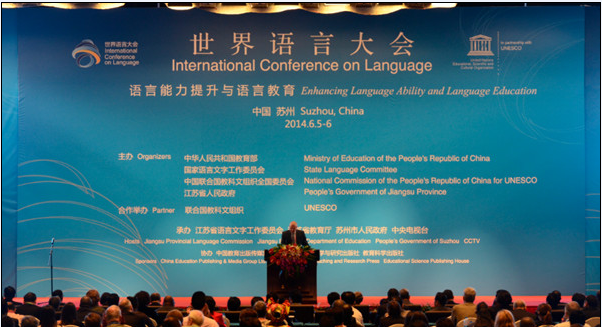Enhancing language education to echo rapid development

In a modern world characterized by economic globalization and cultural diversification, language skills become increasingly important. Language makes possible disseminating knowledge throughout the world and history, and facilitates exchanges among different civilizations. On June 5-6, the International Conference on Language, with the theme “Enhancing Language Ability and Language Education,” co-hosted by the Chinese government and UNESCO was convened in Suzhou, a historical city in Jiangsu Province.
Chinese Vice Premier Liu Yandong attended the opening ceremony and remarked on the importance of language in preserving civilizations and in cross-cultural exchanges. Before the opening, Liu met with Director-General of UNESCO Irina Gueorguieva Bokova and education ministers from other countries.
“Language is the key means in the transmission of civilization from generation to generation; language is the key to promote understanding,” Liu said.
The Chinese government attaches great importance to promoting the national unified language and written characters and to protecting the languages of various ethnic groups. Vice Premier Liu stated: “Every culture, including its special language, should be respected. Every country should learn from each other’s strengths and jointly share achievements in language culture.“
Chinese Education Minister Yuan Guiren presided over the opening of the conference, where Jiangsu Governor Li Xueyong also delivered a speech. About 400 scholars, government officials and representatives of academic institutions from more than 100 countries participated in the conference.
Languages provide the lens through which the world is understood, said Bokova. “They are the foundation for human rights and dignity and the channel for communicating and sharing, for strengthening social cohesion and joint action.”
Li Weihong, vice minister of Education and director of the State Language Work Committee, noted that as far back as 2,500 years ago, “language” was included in the “four disciplines” outlined by the great Chinese philosopher and educationist Confucius. Polato’s Dialogues also addressed the origins of language and its importance for understanding.
“The creation of languages distinguished humans from other animals; the creation of words opened the window of civilization; the integration between language and information technology unveiled a magnificent period of modern civilization,” Li said.
“Language education is indispensable for any strategy to promote poverty eradication, sustainable development and lasting peace,” said Bokova, “UNESCO is determined to promote language diversity as a building block of cultural diversity.”
In April 2014, during the 194th Session of the Executive Board, UNESCO members adopted a decision titled “Language Teaching in Education Systems.” Mohamed Sameh Amr, chairperson of the Executive Board of UNESCO introduced, dedicating the importance to multilingualism to foster mutual understanding.
In a country like China, which features such a long history and many ethnic groups, diversified dialects are on the rise, and adeptness in more than one language is becoming more and more practical in daily life, said Liu Danqing, director of the Institute of Linguistics at the Chinese Academy of Social Sciences (CASS). Currently, CASS is conducting research on eight endangered languages including Manchu, She, Lakkia, Tujia, Western Yugur, Anong, Hezhen and Ersu, with support from the UNESCO Beijing Office.
Lu Jianming, a professor of Chinese literature at Peking University, posited that improving both the individual’s and the nation’s language capacity is a fundamental precondition to enhancing language awareness. Language education is not solely the responsibility of schools, but also relies on families and society. Lu added that the government should formulate language education policies in line with the national situation and should promote reading and oral recitation.
Some emphasized the application of new technology into language education. With the rapid change in international development sphere, the scope of the language education should be expanded, particularly, to the field of economic and social development.
Scholars and policymakers attending the conference reached a “Suzhou Consensus,” which stated: “Promoting exchanges and learning between people, institutions and nations is the important channel to improve language capacity.”
Xu Jialu, director of the State Language Work Committee Advisory Committee, and president of the Society for Chinese Language Teaching, said that since the age of industrialization, languages have rapidly crossed national boundaries and have become very important instruments for understanding different civilizations. However, in the recent two centuries, the unbalanced structure of international communication has caused unequal dialogues. With the rejuvenation of some nations and the deepening of economic globalization, he believed that equality, respect and cooperation are becoming dominant themes in international communication; historical rifts may eventually be removed.
Some participants at the International Conference on Language noted that bottlenecks in language policy and education can limit dialogues across different cultures. They suggested all government leaders should adopt efficient policies and convince academic institutions and enterprises to build “a bridge of languages” together.
Wu Dan and Wang Guanglu are reporters from Chinese Social Sciences Today.
The Chinese version appeared in Chinese Social Sciences Today, No.605, June 9, 2014
Translated by Feng Daimei
The Chinese link: http://www.csstoday.net/xueshuzixun/guoneixinwen/89939.html
